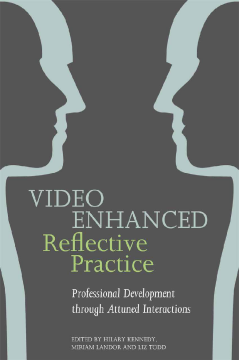
BOOK
Video Enhanced Reflective Practice
Jo Birbeck | Emma Cartwright | Nancy Ferguson | Stephanie Satariano | Ruben Fukkink | Terri Pease | Kaisa Martikainen | Martin Elliott | Anna-Greta Ledin | Emily Archer | Clare Webster | Liz Todd | Miriam Landor | Monika Celebi | Michelle Sancho | Joanna Begley | Fiona Williams | Carole Chasle | Bev Jowett | Cyril Hellier | Helen Upton | Robin Sen | Kirsty Quinn | Wilma Barrow | Helen Gibson | Alex Greene | Ben Hayes | Jenny Jarvis | Angela Underdown | Lucy Browne | Sandra Strathie | Susan Lyon | Jane Nestel-Patt | Maria V. Doria | Hilary Kennedy | Katja Burakoff | Karen Williams | Lia van Rosmalen | Sheridan Forster | Joanne Hewitt | Annemie Wetzels
(2015)
Additional Information
Book Details
Abstract
Video Enhanced Reflective Practice (VERP), an application of Video Interaction Guidance, supports individuals or groups to reflect on and develop their professional communication, teaching or therapeutic skills with their clients through shared review of moments of attuned interaction in video clips of their day-to-day practice.
This book brings together international researchers and practitioners from a range of professions to define VERP, present its theoretical basis and review the current research evidence. Increasing in popularity, VERP is used as a reflective professional development tool for a wide range of professionals and employees, supporting them to analyse and reflect on moments of their effective interaction on video, in situ in the professional environment. The VERP approach is optimistic and empowering, focusing on strength and potential rather than problems or weaknesses.
This book provides examples of VERP's application in a wide range of sectors and will be of interest to trainers, CPD providers, managers, psychologists, social workers, higher education educators, health visitors, early years professionals, teachers, counsellors, therapists, and professionals in the private, voluntary, government and local authority sectors.
What will strike any reader of this book is the diversity of contexts in which VERP has been developed. Instead of pigeon-holing the practice to a specific sector or desired outcomes the case studies illustrate both its core qualities and its dynamic flexibility. Unlike many new interventions, VERP has a genuine and authentic history of sustained development meaning that practices have become theorised and nuanced. VERP allows users to make change visible and thus persuades them that it is possible.
Rachel Lofthouse, Head of Teacher Development and Learning, School of Education, Communication and Language Sciences, Newcastle University, UK
I wish that this book had been around when we started to implement the VIG model in the area of helping professions. Reading the book brought back to me all the excitement I experienced when confronted with these ideas for the very first time. This same excitement was always present when I witnessed individuals change through using VERP. I hope the reader will find, in the breadth and depths of the projects described and in the enthusiasm of the participants, encouragement to start the VERP journey and inspiration for those readers already on it.
Katerina Šilhánová, Founder and Director, National Training Institute for VIG, Czech Republic
Video Enhanced Reflective Practice is a dynamic 'complex and creative dance' in Landor, Kennedy and Todd's hands. They tell how videos create challenging 'retrospective mirrors', bringing practitioners face to face with themselves and previously unperceived elements, including unfounded assumptions. Hard questions are asked, helping practitioners develop greater understanding, trust in, and respect for, themselves and their clients.
Gillie Bolton, PhD, author of Reflective Practice Writing and Professional Development, 4th Edition (Sage, 2014)
Video Enhanced Reflective Practice applies a new idea concerning how respectful responses to an individual's expressions of their purposes and concerns sustain thriving relationships; from infants and parents in families, through to the successful management of roles in a school, corporation or city. This path-finding book reports and explains the successes of VERP for many relationships across many countries.
Colwyn Trevarthen, PhD, FRSE, Professor (Emeritus) of Child Psychology and Psychobiology, Department of Psychology, The University of Edinburgh, UK
